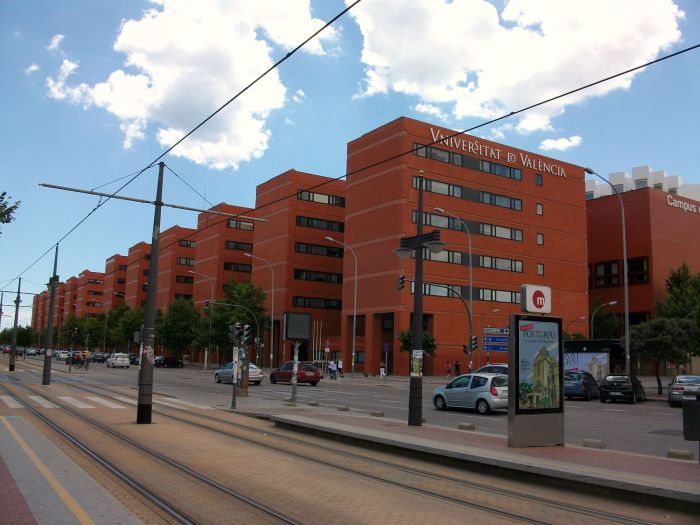Embark on a captivating journey into the heart of Valencia University Spain, a renowned institution steeped in history and academic excellence. Its ancient walls whisper tales of intellectual pursuits, while its modern facilities propel students towards a future of innovation and discovery.
From its humble beginnings to its present-day status as a leading university in Spain, Valencia University has played an integral role in shaping the nation’s higher education landscape. Join us as we explore its rich heritage, diverse academic offerings, vibrant campus life, and unwavering commitment to progress.
History and Background of Valencia University
Valencia University, established in 1499, holds a prominent place in the annals of higher education in Spain. Its origins can be traced back to the General Study of Valencia, founded in 1246 by King James I of Aragon. Over the centuries, the university has evolved into a comprehensive institution renowned for its academic excellence and contributions to various fields of knowledge.
Key Events in Valencia University’s History
- 1246: Establishment of the General Study of Valencia by King James I of Aragon.
- 1499: King Ferdinand II of Aragon and Queen Isabella I of Castile grant a royal charter to the General Study, officially establishing Valencia University.
- 1502: The university establishes its first printing press, playing a crucial role in the dissemination of knowledge during the Renaissance.
- 1785: The university undergoes a major reform under King Charles III, modernizing its curriculum and expanding its facilities.
- 19th Century: Valencia University becomes a center for liberal and progressive ideas, contributing to the intellectual and political movements of the time.
- 20th Century: The university expands its campus and establishes new faculties, becoming a major research and teaching institution.
- 21st Century: Valencia University continues to grow and innovate, achieving international recognition for its research and teaching excellence.
Valencia University’s Role in Higher Education in Spain
Valencia University has played a pivotal role in the development of higher education in Spain. It is one of the oldest and most prestigious universities in the country, consistently ranked among the top institutions in national and international rankings. The university’s contributions to research and teaching have had a profound impact on the Spanish academic landscape, shaping the intellectual and cultural development of the nation.
Academic Programs and Faculties

Valencia University offers a comprehensive range of academic programs across a diverse spectrum of disciplines, catering to the educational aspirations of students worldwide. The university’s academic offerings are organized into several faculties, each specializing in a distinct field of study.
The faculties at Valencia University include:
- Faculty of Medicine and Dentistry
- Faculty of Pharmacy
- Faculty of Nursing and Podiatry
- Faculty of Philosophy and Educational Sciences
- Faculty of Philology, Translation and Communication
- Faculty of History, Geography and Art
- Faculty of Law
- Faculty of Economics
- Faculty of Social Sciences
- Faculty of Mathematics
- Faculty of Physics
- Faculty of Chemistry
- Faculty of Biology
- Faculty of Computer Science
Each faculty offers a wide range of undergraduate, graduate, and postgraduate programs, encompassing both theoretical and practical components. The programs are designed to equip students with the knowledge, skills, and critical thinking abilities necessary to excel in their chosen fields.
Research Strengths and Specializations
Valencia University is renowned for its robust research endeavors, with a particular focus on interdisciplinary collaborations. The university has established several research centers and institutes, each dedicated to a specific area of inquiry. These centers foster innovation, facilitate knowledge exchange, and drive advancements in various fields.
Some of the key research strengths and specializations at Valencia University include:
- Biomedicine and Health Sciences
- Sustainable Energy and Environmental Sciences
- Artificial Intelligence and Data Science
- Cultural Heritage and Tourism
- Social Inclusion and Education
Through its commitment to cutting-edge research, Valencia University contributes to the advancement of knowledge and addresses pressing societal challenges, both locally and globally.
Campus and Facilities
Valencia University’s main campus is a sprawling urban oasis located in the heart of Valencia city. Its impressive architectural ensemble blends historic buildings with modern facilities, creating a vibrant and stimulating learning environment for students.
The campus boasts a wide range of facilities designed to support students’ academic and extracurricular pursuits. These include state-of-the-art laboratories equipped with cutting-edge technology, spacious libraries housing vast collections of books and journals, and dedicated student centers that offer a variety of services and support systems.
Libraries
Valencia University’s libraries are renowned for their extensive collections and modern amenities. The main library, the Biblioteca General, houses over 2 million volumes and provides access to a vast array of online resources. The library’s spacious reading rooms and comfortable study areas offer an ideal environment for research and academic work.
Laboratories
The university’s laboratories are equipped with the latest technology and instrumentation, providing students with hands-on experience in various scientific disciplines. The laboratories are staffed by experienced technicians and faculty members who provide guidance and support to students.
Student Centers
Valencia University’s student centers are vibrant hubs of student life, offering a range of services and activities. These centers provide support for academic advising, career counseling, health and wellness services, and extracurricular activities.
Sustainability and Environmental Initiatives
Valencia University is committed to sustainability and environmental stewardship. The campus has implemented various initiatives to reduce its environmental footprint, including energy-efficient lighting, water conservation measures, and recycling programs. The university also promotes sustainable practices among its students and staff, fostering a culture of environmental responsibility.
Student Life and Culture

Valencia University fosters a vibrant and inclusive student community. Beyond academics, students immerse themselves in a rich tapestry of social and cultural activities that enrich their university experience.
The university organizes a plethora of events, clubs, and societies that cater to diverse interests. From sports and fitness to art, music, and theater, there’s something for every student to explore and connect with like-minded peers.
International Student Community
Valencia University welcomes a large and diverse international student population. The university provides comprehensive support services to ensure their smooth transition and integration into the university community. International students benefit from dedicated orientation programs, language support, and cultural exchange initiatives.
- Orientation programs: These programs provide essential information and guidance to new international students, covering topics such as academic regulations, visa requirements, and cultural adjustment.
- Language support: The university offers language courses and tutoring to help international students improve their Spanish proficiency, facilitating their academic and social interactions.
- Cultural exchange initiatives: Valencia University actively promotes cultural exchange through events, workshops, and collaborations with local and international organizations. These initiatives foster a sense of belonging and create opportunities for students to learn about different cultures and perspectives.
Rankings and Reputation

Valencia University has consistently ranked among the top universities in Spain and has gained international recognition for its excellence in teaching and research.
In the QS World University Rankings 2023, Valencia University is ranked 246th globally and 12th in Spain. It is also ranked among the top 200 universities worldwide in several subject areas, including Arts and Humanities, Engineering and Technology, and Life Sciences and Medicine.
Reputation for Excellence
Valencia University has a long-standing reputation for providing high-quality education and conducting cutting-edge research. Its faculty members are renowned experts in their fields, and its research centers are actively engaged in projects that address global challenges.
Notable Alumni
Valencia University has produced a number of notable alumni who have made significant contributions to society. These include:
- Santiago Calatrava, architect and engineer known for his iconic buildings, including the City of Arts and Sciences in Valencia
- Vicente Blasco Ibáñez, novelist and journalist who played a key role in the development of Spanish literature
- Joan Fuster, essayist and literary critic who is considered one of the most influential intellectuals of the 20th century
FAQ Insights
What is Valencia University Spain’s history?
Valencia University was founded in 1499 and has a rich history of academic excellence and innovation.
What academic programs does Valencia University Spain offer?
Valencia University offers a wide range of undergraduate and graduate programs across various faculties, including arts, sciences, law, medicine, and engineering.
What is the campus life like at Valencia University Spain?
Valencia University has a vibrant and diverse campus life, with numerous student clubs, organizations, and cultural events.




